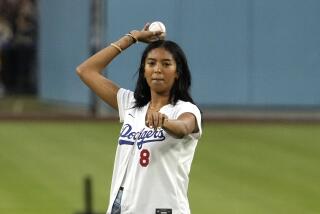Doris Sams dies at 85; star in women’s baseball league
- Share via
She was one of the few women to pitch a perfect professional baseball game, a 1947 achievement that she downplayed decades later by saying: “I just got lucky.”
Baseball records present a less-humble account of the career of Doris Sams. She was an all-star for at least five of her eight seasons in the All-American Girls Professional Baseball League, established in 1943 by Chicago Cubs owner Philip K. Wrigley to keep ballparks filled while men were away at war.
While on the roster of Michigan’s Muskegon Lassies, Sams was named player of the year in 1947, making the all-star team as both a pitcher and outfielder. Throwing sidearm, she pitched her perfect game that year against the Fort Wayne Daisies in front of thousands of fans. She also set the league record for home runs with 12 in 1952.
When the Baseball Hall of Fame in Cooperstown, N.Y., unveiled an exhibit in 1988 honoring women in baseball, it brought Sams and her league-mates renewed attention and helped inspire the 1992 film “A League of Their Own,” according to a hall of fame history.
Sams, who was 85 and had Alzheimer’s disease, died June 28 in Knoxville, Tenn. Her death was confirmed by Stevens Mortuary Chapel in Knoxville.
As a player she was “always calm, cool and collected,” according to the All-American Girls Professional League Players Assn., founded to preserve the league’s history. Another historical account called Sams “a fine defender and a gazelle in the outfield.”
A standout fast-pitch softball player, Sams sought a tryout in 1946 when a pair of league teams were passing through Knoxville. At 19, she was sent to Muskegon to join the Lassies, an expansion team that moved to Kalamazoo, Mich., in 1950.
The teams played “in these factory towns where the people were making good money, but they had gas rationing and couldn’t go anywhere,” Sams told the Associated Press in 1988. “After the war they went other directions … but we entertained them for a while.”
After playing two positions for about three years, Sams later said she told her coach to “make up his mind about where to play me or pay me two salaries. I pretty much played outfield after that.”
On Aug. 18, 1947, Sams pitched her perfect game, when not a single Daisy reached base and the Lassies won 2-0. Sams later recalled that the game “wasn’t so perfect.”
“They hit me like a drum. But it was one of those days when everybody was on their toes. … You know, the pitcher doesn’t do it alone,” Sams told the Society for American Baseball Research in 1997.
In 1949, Sams was again singled out as player of the year. She was one of the league’s best hitters, averaging above .300 during each of her last four seasons. She retired after the 1953 season, and the league folded the next year.
In interviews, Sams invariably pointed out a key difference between the men’s and women’s game — the uniforms.
“We wore skirts, you know,” Sams said in the 1988 AP interview. “Believe me, you haven’t lived until you’ve slid on skin. You talk about strawberries. One of the girls dated a Triple-A player who used to say there wasn’t enough money to get him to slide on skin, and he was right.”
Doris Jane Sams was born Feb. 2, 1927, in Knoxville to Robert and Pauline Sams. Her grandfather and father both played semi-professional baseball, according to Doris, and she grew up playing sports with her two older brothers.
In 1938, Sams won a regional marbles tournament and became the Knoxville badminton champion in 1942.
Upon retiring from professional baseball, she returned home and worked in the offices of the Knoxville Utilities Board. She never married and had no immediate survivors.
After viewing “A League of Their Own,” which starred Tom Hanks as the manager who says “there’s no crying in baseball,” Sams declared the film “about 30% truth and 70% Hollywood.”
In Cooperstown, memorabilia belonging to “Sammye”— as players called her — also helped tell the league’s story. One of her MVP trophies, a Louisville Slugger bat that she wielded and a photograph of her hitting the ball have been featured in the display.
More to Read
Start your day right
Sign up for Essential California for the L.A. Times biggest news, features and recommendations in your inbox six days a week.
You may occasionally receive promotional content from the Los Angeles Times.








